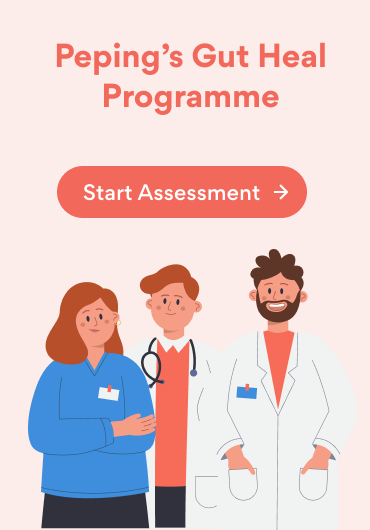How many of us have been guilty of loving food too much? Or going in for that extra bite, even when we know we’re pushing the limits of our stomach’s capacity? Well, then we’ve all probably come across that notorious culprit that can turn our delightful culinary experiences into uncomfortable episodes of regret: indigestion.
Picture this: You’ve just devoured a mouthwatering feast, your taste buds singing with joy, only to be met with a fiery, burning sensation that puts a damper on the entire affair. Oh, the betrayal! Well, that’s exactly what we’re talking about in today’s blog- the truth behind those tummy troubles with a little ammunition on how to tackle them!
What is indigestion?
Indigestion, also known as dyspepsia, is a discomfort or pain in the upper abdomen. It can manifest as bloating, belching, heartburn, or a feeling of fullness during or after a meal. It occurs when the normal functioning of the digestive system is disrupted, which can be caused by factors such as overeating, consuming spicy or fatty foods, excessive alcohol intake, stress, certain medications, or underlying conditions like GERD or peptic ulcers.
Understanding the causes and symptoms of indigestion is key to finding relief and restoring balance to our stomachs.
What causes indigestion?
Indigestion can be triggered by a variety of factors…
- Overeating, We’ve all been there- that moment when we consume more food than our stomachs can comfortably handle. Well, excessive food overwhelms our digestive system, leading to discomfort and a persistent feeling of fullness causing indigestion.
- Spicy and fatty foods, Spices, in particular, have a tendency to irritate the delicate lining of the stomach, potentially triggering indigestion. Additionally, fatty foods can slow down the digestion process, making us feel heavy and bloated.
- Excessive alcohol intake, Alcohol can irritate the stomach lining, increase acid production, and relax the muscles that keep stomach acid from flowing back into the esophagus.
- Stress, too, can also take a toll on our digestive health. When we’re stressed, our bodies produce stress hormones that can disrupt the normal functioning of the digestive system. The intricate dance of digestion gets thrown off balance, leading to indigestion and other digestive discomforts.
- Smoking. It weakens the lower esophageal sphincter, the muscle responsible for keeping stomach acid from flowing back into the esophagus. This weakening can result in acid reflux and, in turn, indigestion.
- Lastly, underlying conditions such as Gastroesophageal Reflux Disease (GERD) or peptic ulcers. These conditions disrupt the normal functioning of the digestive system, leading to persistent indigestion symptoms.
How can I prevent indigestion?
Preventing indigestion is possible with a few simple lifestyle adjustments. Here are some tips to reduce the likelihood of experiencing those unpleasant tummy troubles:
- Eat smaller, more frequent meals: Instead of indulging in large portions, opt for smaller, more frequent meals throughout the day. This approach allows your digestive system to handle a manageable amount of food at a time, reducing the strain on your stomach.
- Avoid trigger foods: Be mindful of trigger foods that may exacerbate indigestion symptoms. Spicy and fatty foods, citrus fruits, onions, garlic, and carbonated beverages are known culprits for many people.
- Chew thoroughly and eat at a slower pace: Take the time to thoroughly chew your food and eat at a slower pace. By doing so, you allow your saliva to start the digestive process, aiding in easier breakdown of the food. Putting down the fork between bites, engaging in conversation, and savouring each bite can help prevent indigestion.
- Maintain a healthy weight: Excess weight can put pressure on your abdomen and contribute to acid reflux and heartburn. Strive for a balanced diet, engage in regular physical activity, and aim for a healthy weight range to reduce the risk of indigestion.
- Manage stress levels: Find healthy ways to manage stress, such as practicing relaxation techniques, engaging in physical activity, or pursuing activities you enjoy. Taking time for self-care and finding moments of tranquility can help alleviate stress and reduce the risk of indigestion.
- Refrain from lying down immediately after eating: After a meal, it’s best to remain upright for at least a couple of hours. When you recline or lie down, gravity is no longer assisting your digestive system, making it easier for stomach acid to flow back up into the esophagus, leading to heartburn and indigestion. If you need to lie down, prop yourself up with pillows to maintain an elevated position.
Does indigestion affect everyone in the same way?
Indigestion is not a one-size-fits-all experience. It can manifest differently from person to person. While some individuals may primarily experience heartburn, others may encounter symptoms such as bloating, excessive gas, belching, or a feeling of fullness after meals.
The variation in indigestion symptoms can be attributed to factors such as differences in individual digestive systems, underlying causes of indigestion, and personal sensitivities. Some people may have a heightened sensitivity to certain foods or beverages, leading to specific symptoms like bloating or gas. Others may be more prone to experiencing acid reflux, resulting in heartburn as the primary symptom.
Understanding your specific indigestion symptoms is crucial in finding the most effective remedies. For instance, if heartburn is your main concern, focusing on managing stomach acid production and avoiding triggers that exacerbate acid reflux can be beneficial. On the other hand, if bloating and gas are your primary issues, paying attention to your diet and identifying potential trigger foods can help alleviate those symptoms.
Are there any home remedies for indigestion?
When it comes to indigestion, there are several home remedies that you can try to alleviate symptoms and promote healthy digestion. Here are a few:
- Herbal Teas: Ginger and chamomile tea can help soothe the stomach and relieve indigestion. Choose them over caffeinated drinks! PS: Adding a touch of honey/ lemon can enhance the flavour.
- Probiotics: Incorporating probiotics into your diet can promote a healthy balance of gut bacteria and aid digestion. Probiotics can be found in fermented foods like dahi(yogurt), kombucha and kimchi. Alternatively, you can opt for over-the-counter probiotic supplements.
- Warm water with lemon: Drinking a glass of warm water with a squeeze of lemon juice before meals may help stimulate digestion. The warm water can help relax the digestive muscles, while the acidic properties of lemon juice can aid in the breakdown of food.
- Buttermilk: “Chaas” is a refreshing beverage choice that can aid digestion as it contains probiotics that promote a healthy gut and can help ease indigestion.
- Fennel seeds: Chew on a teaspoon of saunf/fennel seeds or make a soothing fennel tea by steeping the seeds in hot water. Fennel seeds can help reduce bloating and ease indigestion.
Remember, these home remedies are meant to provide relief for mild indigestion symptoms. If you have severe or persistent symptoms, it’s important to consult a healthcare professional for proper diagnosis and treatment.
When should I seek medical help for indigestion?
If you experience severe or persistent symptoms of indigestion that do not improve with home remedies or over-the-counter medications, it’s important to seek medical attention. Additionally, unexplained weight loss alongside indigestion symptoms, difficulty swallowing, or worsening symptoms over time are indicators that medical help should be sought. These can be signs of underlying conditions that require professional evaluation and treatment. Furthermore, if you notice other concerning symptoms such as persistent vomiting, unexplained fatigue, blood in vomit or stools, or jaundice, it is essential to promptly consult a healthcare professional. By listening to your body and seeking timely medical advice, you can receive an accurate diagnosis and appropriate treatment to effectively address your indigestion concerns.
Can indigestion be a symptom of a more serious condition?
Indigestion, in some cases, can serve as a symptom of an underlying condition that warrants further investigation. While indigestion is commonly experienced on its own, it can also be indicative of more serious digestive disorders. Gastroesophageal reflux disease (GERD) is one such condition that may cause indigestion as a symptom. GERD occurs when stomach acid flows back into the esophagus, leading to irritation and discomfort.
Peptic ulcers, which are open sores that develop in the lining of the stomach or upper small intestine, can also manifest as indigestion. Gallstones, which obstruct the bile ducts, and stomach infections are additional examples of conditions that can present with indigestion as a symptom.
If you have concerns about your indigestion or suspect an underlying condition, it’s crucial to seek medical advice for a proper diagnosis.
How is indigestion diagnosed?
Healthcare professionals follow a comprehensive approach to gather information and identify the underlying causes behind indigestion. Here’s a breakdown of the typical diagnostic process:
- Medical history: Your doctor will start by taking a detailed medical history, asking about your symptoms, their frequency and duration, any triggers or patterns you’ve noticed, and your overall health.
- Physical examination: A physical examination may be conducted to assess your overall health and look for any signs or symptoms that could indicate underlying conditions related to indigestion. This examination may involve checking your abdomen for tenderness or bloating and evaluating other relevant areas of the body.
- Diagnostic tests: Depending on the findings from your medical history and physical examination, your doctor may recommend specific diagnostic tests*. These tests can help confirm or rule out potential underlying causes of indigestion. Common diagnostic tests for indigestion may include:
- Blood tests
- Stool tests
- Imaging tests
- Endoscopy
*The specific diagnostic tests used will depend on your individual case and the suspected underlying cause of your indigestion.
Remember, the diagnostic process is crucial in identifying the root cause of your indigestion and guiding appropriate treatment. It’s important to work closely with your healthcare professional to ensure an accurate diagnosis and tailored management plan.
What over-the-counter remedies can help relieve indigestion?
Over-the-counter remedies can provide relief from indigestion symptoms. One option is antacids, which are easily accessible without a prescription. Antacids work by neutralizing stomach acid, offering temporary relief from symptoms like heartburn, bloating, and indigestion.
Another option to consider is proton pump inhibitors (PPIs) or H2 blockers, which are available over-the-counter in some countries. These medications work by reducing the production of stomach acid, providing longer-lasting relief for indigestion symptoms. However, it’s advisable to consult a pharmacist or healthcare professional before using these medications to ensure they are suitable for your specific situation and to discuss any potential interactions or side effects.
Remember, while over-the-counter remedies can offer relief, it’s important to use them responsibly and be mindful of any persistent or severe symptoms. If your symptoms persist or worsen, it’s always recommended to consult a healthcare professional for further evaluation and guidance.
Can lifestyle changes improve indigestion?
Lifestyle changes can indeed play a crucial role in improving indigestion and promoting a healthy digestive system. Let’s explore some lifestyle modifications that can make a positive impact:
- Healthy diet: Incorporate plenty of fruits, vegetables, whole grains, and lean proteins into your meals. Limit your intake of greasy, spicy, and fatty foods that can trigger indigestion. Eating smaller, more frequent meals can also help prevent overloading your stomach.
- Stress management: Find healthy ways to manage stress, such as engaging in relaxation techniques like deep breathing exercises, meditation, or yoga. Taking time for self-care, pursuing hobbies, and maintaining a healthy work-life balance can also help reduce stress levels and improve digestion.
- Quitting smoking: Smoking weakens the lower esophageal sphincter, allowing stomach acid to flow back into the esophagus, causing heartburn and indigestion. Quitting smoking can lead to significant improvements in digestive health.
- Moderate alcohol consumption: Limit your alcohol consumption and be mindful of your body’s response to alcohol. It’s best to enjoy alcoholic beverages in moderation, if at all, to reduce the risk of indigestion. Substitute boozy activities with sober adventures or opt for refreshing mocktails at parties (it does not make you “uncool”)!
- Regular physical activity: Exercise helps stimulate digestion, promote regular bowel movements, and reduce stress levels. Aim for at least 30 minutes of moderate-intensity exercise most days of the week, such as brisk walking, jogging, or cycling.
Indigestion may be an unwelcome guest at times, but armed with knowledge and a few simple strategies, you can tame the unruly beast. Remember to listen to your body, make conscious food choices, and adopt healthy habits to promote optimal digestion. While occasional indigestion is common, it’s crucial to pay attention to persistent or severe symptoms and seek professional advice if needed. Keep in mind that everyone’s digestive system is unique, so finding what works best for you may require some trial and error. Stay curious, embrace moderation, and let your culinary adventures continue without any unpleasant side effects!













